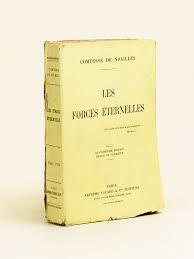Wikipedia:
Anna, Comtesse Mathieu de Noailles (15 November 1876 – 30 April 1933) was a Romanian-French writer.
Born Princess Anna Elisabeth Bibesco-Bassaraba de Brancovan in Paris, she was a descendant of the Bibescu and Craioveşti families of Romanian boyars. Her father was Prince Grégoire Bibesco-Bassaraba, a son of Wallachian Prince Gheorghe Bibesco and Zoe Mavrocordato-Bassaraba de Brancovan. Her Greek mother was the former Ralouka (Rachel) Mussurus, a musician, to whom the Polish composer Ignacy Paderewski dedicated several of his compositions. Via her mother, Anna de Noailles is a great-great-granddaughter of Sophronius of Vratsa, one of the leading figures of the Bulgarian National Revival, through his grandson Stefan Bogoridi, caimacam of Moldavia.[1]
In 1897 she married Mathieu Fernand Frédéric Pascal de Noailles (1873–1942), the fourth son of the 7th Duke de Noailles. The couple soon became the toast of Parisian high society. They had one child, a son, Count Anne-Jules de Noailles (1900–1979).
Anna de Noailles wrote three novels, an autobiography, and many collections of poetry. She had friendly relations with the intellectual, literary and artistic elite of the day including Marcel Proust, Francis Jammes, Colette, André Gide, Frédéric Mistral, Robert de Montesquiou-Fezensac, Paul Valéry, Jean Cocteau, Pierre Loti, Paul Hervieu, and Max Jacob.
So popular was Anna de Noailles that various notable artists of the day painted her portrait, including Antonio de la Gandara, Kees van Dongen, Jacques Émile Blanche, and the British portrait painter Philip de László. In 1906 her image was sculpted by Auguste Rodin; the clay model can be seen today in the Musée Rodin in Paris, and the finished marble bust is on display in New York's Metropolitan Museum.
She died in 1933 in Paris, aged 56, and was interred in the Père Lachaise Cemetery. She was a cousin of Prince Antoine Bibesco and Princess Marthe Bibesco.
Anna de Noailles was the first woman to become a Commander of the Legion of Honor, the first woman to be received in the Royal Belgian Academy of French Language and Literature, and she was honored with the "Grand Prix" of the Académie Française in 1921.[2]
Countess de Noailles served as a juror with Florence Meyer Blumenthal in awarding the Prix Blumenthal, a grant given between 1919-1954 to painters, sculptors, decorators, engravers, writers, and musicians.[3]
Plagued by lifelong health problems, after 1911 Noailles often remained in her bedroom, where she wrote and received guests. Present-day visitors to the Musée Carnavalet in Paris can see, facing the display of Proust’s bedroom, a reconstitution of the modest room in which Noailles’s friendship with such figures as Jean Cocteau and Colette developed. After the War, Noailles published Les Forces éternelles (1920).
Littérature. Poésie. 12,1x19. 421p. Fort in-12° Etat correct. Dos plissé. Papier bruni. Dos frotté avec petits manques. Nom en page de titre
